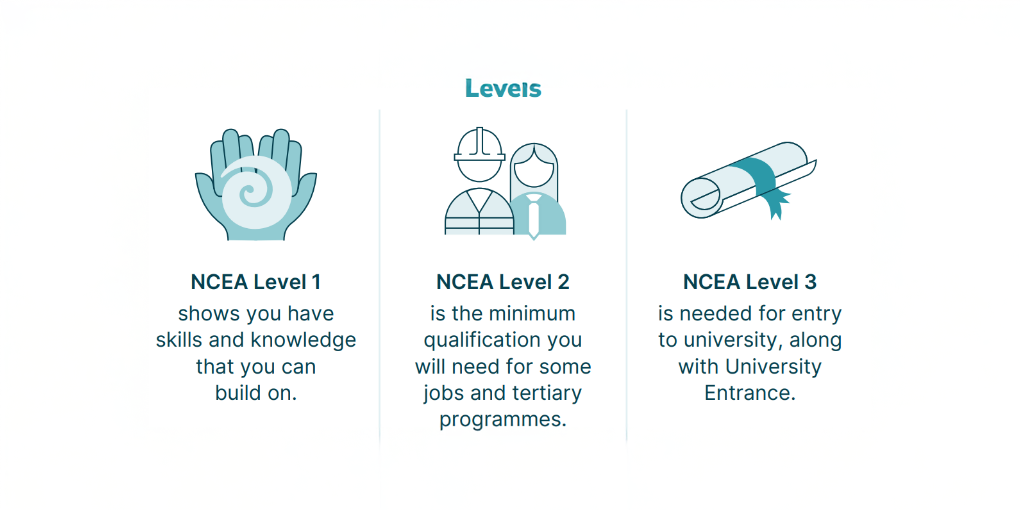
You are logged in as
Logout
You are logged in as
Logout
Dear Parents and Caregivers
There can be a real issue with students as they move out of the newness and intensity of Level 1 NCEA; they develop misunderstandings about the various aspects of Level 2 or 3 NCEA and some risk becoming a bit ‘blasé’ about the qualification. As the academic year goes by, students (and it really helps if parents can do this too) need to maintain awareness of the various aspects of the qualification as it applies to them at Year 12 or 13 and understand what that means for them in this year’s NCEA ‘effort’.
In this newsletter, I am reminding parents about our key policies regarding internal assessment, including extensions and the provision of medical certificates and authenticity with particular emphasis on how generative AI should be used with learning and assessment. I’ll also round off the details of the additional awards that are available in NCEA Level 2 and 3, specifically, course endorsement and University Entrance, and I reiterate for parents of Year 12 students the perhaps surprising importance of Level 2 achievement – it really does matter and it’s important that the students ‘keep their eye on the ball’!
Our important mid-year academic reports process will run during this term, during which time all students will have a report written about them by each of their teachers and a summary comment from their tutor. In this newsletter you can read about what we report on and what you can expect in your child’s report feedback – the timelines are tight, but we stick to them so that we can report to all parents before the end of this term.
Finally, some words of encouragement. I cannot emphasise enough just how important parents’ help is to their child’s successful navigation through the ‘NCEA waters’ even as their student moves up the NCEA levels. Taking an interest in what they are doing (even when they possibly don’t want you to), being aware of when they have assessments due and tests to sit, helping them to manage their commitments, both in-school and out-of-school, checking on their results and progress towards their gain of NCEA, and maybe keeping them honest with setting of some academic targets is so helpful for students. True, there are students who seem to have it all sorted and do not need a lot of other help, but that is not always the case and a small bit of checking up on them is a good thing!
So, you can see just how busy teachers and students are with their learning and their assessment work in NCEA at this time. If you do have any questions from what you have read in this newsletter, please feel free to contact me via email with any questions that you may have about NCEA at DBV@stac.school.nz.
Kind regards
David Bevin
Head of Teaching and Learning

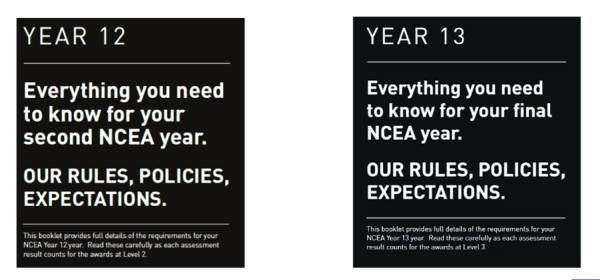
We have clear rules and procedures for students to follow covering many matters including student absence from an internal, late submission and breaches of authenticity and these are all detailed in the student copy of the ‘Rules and Procedures’. All students received their own copy of the ‘R & P’ in March in their tutor times; they must read them as the rules must be, and are, applied in all assessments.
NCEA DOCUMENTS FOLDER >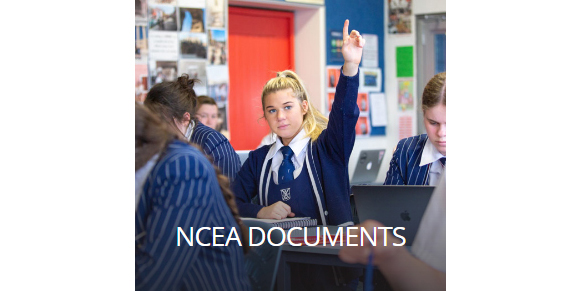
Requests for extensions and absence from assessments have been happening quite a lot this year so it is important for you to know that we have clear processes and rules for managing those issues so that assessment is fair to all students. Students cannot simply just hand in an assessment late or not turn up to a test without having a valid, and approved, reason. They must follow our procedures in this area.
In mid-March, this post was placed in each year level’s Teams page providing the link to the online form for applying for an extension in an NCEA assessment. Our process is very simple, and I can confidently say that it is working well.

For medical conditions, students must provide a medical certificate as part of their application; if they do not, they will not have an extension. This is non-negotiable on the school’s part.

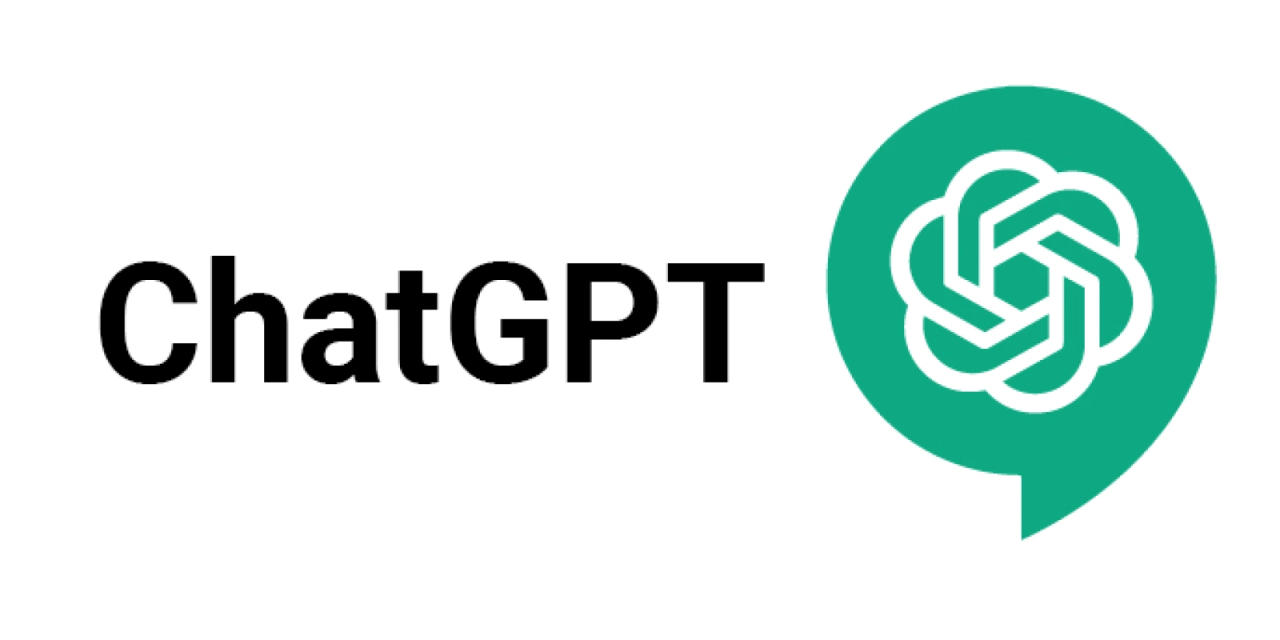
Greetings! We are delighted to present our school parent newsletter, dedicated to discussing our decision not to incorporate Chat GPT into NCEA internal assessments. Join us as we delve into the reasons behind this choice, highlighting the importance of human interaction, authentic learning experiences, and fostering critical thinking skills in our students. (ref: Chat GPT)
In the NCEA ‘Rules and Procedures’ booklet, the rules regarding ‘Authenticity’ have been very clearly explained, along with the ‘penalty’ for a breach in this area. In addition, late last term, students received an email with a link to an online statement that they were asked to digitally sign to confirm their understanding of, and agreement with, our rules and processes in this area, especially regarding the use of generative AI in assessment.
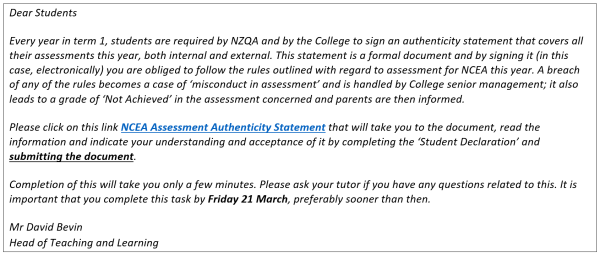
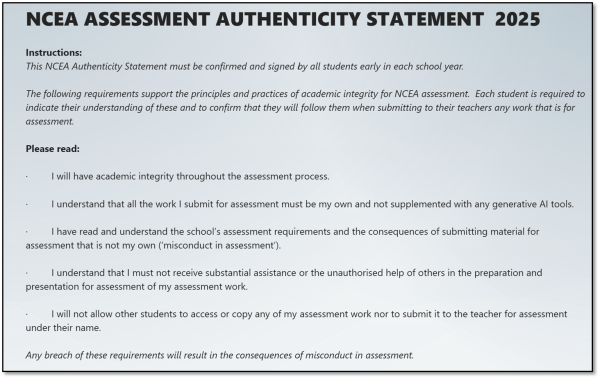
The successful management of NCEA relies on both teachers and students following the rules regarding internal assessment. Basically, we have four ‘golden rules’ that students must follow if they wish to successfully accumulate their grades and credits towards their NCEA achievement targets. The rules are detailed in the ‘Rules and Procedures’ as follows in this screen shot.
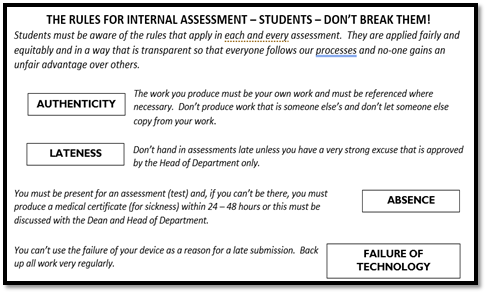
The rules can be further summed up this way:
Students should note that it is very rare for us to vary these rules and, unless there are exceptional circumstances that apply to a particular situation, these rules will be fully applied.
Academic integrity underlies the rule regarding authenticity. The rule regarding lateness requires students to meet deadlines and to not be casual about doing so. If a student is legitimately absent, they must prove that there is an acceptable reason for being so and that must be attested to by an independent professional such as a doctor. Finally, students are typically very capable of blaming their devices and various systems so we simply put the onus on them to ensure that their device is always functioning well, and we require them to back up their work so that, if there is a system failure, they can still retrieve the work and submit it on time. In short, these rules are about ensuring honesty in our system; they have proven to be very robust and effective and provide a great deal of integrity in our NCEA process.
Course Endorsement is usually harder to gain and requires a mixture of internal and external assessment success.
Course endorsement is also called Subject endorsement. It is an award that is applied to individual subjects that are run by an individual school. Again, Merit and Excellence grades and their associated credits are accumulated.
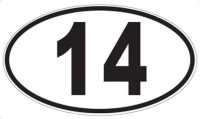 To gain Excellence endorsement in, say, Mathematics (as an example), a student must gain at least 14 credits at Excellence level BUT part of this must come from at least 3 Excellence credits in an internal and at least 3 Excellence credits in an external.
To gain Excellence endorsement in, say, Mathematics (as an example), a student must gain at least 14 credits at Excellence level BUT part of this must come from at least 3 Excellence credits in an internal and at least 3 Excellence credits in an external.
To gain Merit endorsement in, say, English, a student must gain at least 14 credits at Merit or Excellence level BUT part of this must come from at least 3 Merit or Excellence credits in an internal and at least 3 Merit or Excellence credits in an external.
To gain ‘Achievement’ endorsement in a subject, as part of the 14 credits gained, a student must have gained at least the level of ‘Achievement’ in standards while still not meeting the requirements for Merit or Excellence.
The ‘external’ requirement means that the exam (or, for example, an externally assessed portfolio such as in Visual Arts) has extra importance in course endorsement.
A note about 12 and 13 PHED/PHLED – Physical Education for NCEA: Because there are no external standards for this subject, so that a course endorsement can still be gained, the external credits requirement is not used.
Course endorsement is only awarded in the academic year (that is, it cannot be accumulated over more than one year).
Year 12 Students who completed Level 2 subject/s in Year 11 in 2024
Any Excellence or Merit credits gained last year will be added to their totals this year and so contribute to their overall endorsement total for Level 2. As above, however, those credits cannot be counted for Course Endorsement awards in 2025.
The situation is similar for Year 13 students who completed Level 3 subject/s in Year 12 in 2024.
Year 12 Students who are sitting both Level 2 and Level 3 NCEA subjects this year
A small number of students will have a course with sufficient assessment opportunities for them to gain both Level 2 and Level 3 in the same year – this will usually only be students who are doing three subjects at each level this year. It is possible for them to gain not only the NCEA level qualification but also both certificate endorsement awards. If a student would like to know more about this, they should contact me directly so that I can provide more details about this…. it’s a bit complicated for busy parents to absorb!
A student needs four things to gain UE.

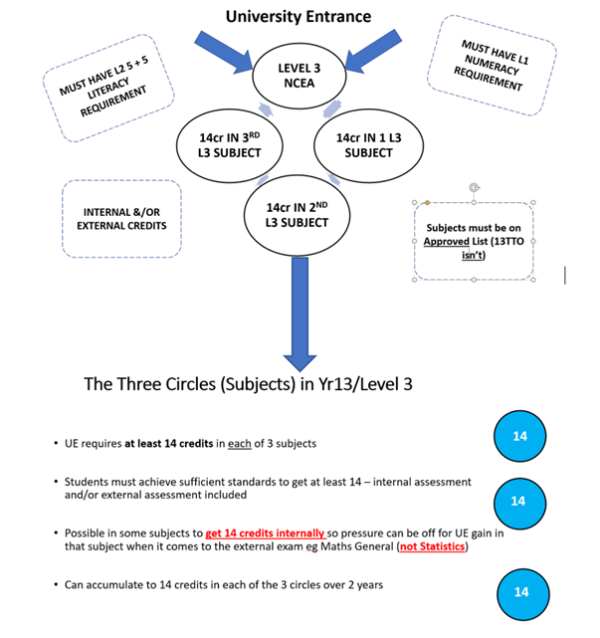
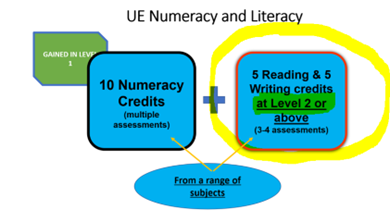
The above requirement for the gain of five Reading and five Writing credits as part of UE is quite challenging. A number of students will take up to the end of their Year 13 year to complete this requirement and, at the start of Year 13, we identify those who will require additional support in their final year for their gain of UE literacy. The UE reading and writing standards are very specific and are identified in a very limited number of subjects – English is not the only subject in this instance. Each subject’s course outline (that can be accessed on StACNet) indicates if any of the standards assessed in the course count towards UE Reading or Writing. The example from the Year 13 Geography programme course outline below shows which standard/s provide/s credits for both actual subject-related content and for literacy. Because our course outlines are standardised in format, you can check this out in all subjects.
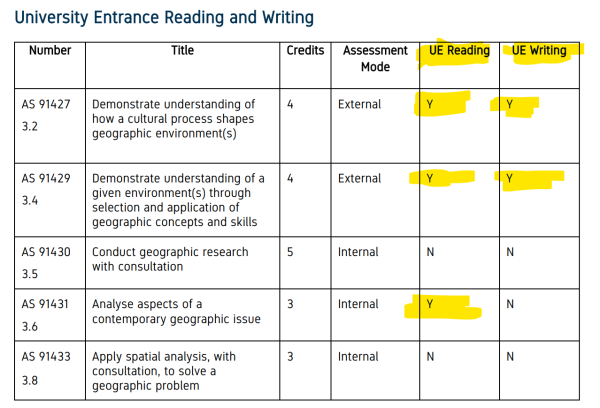
Students can ‘credit’ credits gained from tests for the NZ Driver’s Licence as shown in this screen shot. While the credits aren’t large in number, every bit might help. Gaining one’s driver’s licence is one of those ‘rites of passage’ for young people and they can gain credits for their NCEA as part of that ‘rite’.
To ‘redeem’ their credits, students need to see Mrs Faulls.

It can be tempting for students to think that Level 2 is not such a ‘big deal’ when it comes to their NCEA achievement and that it’s sort of a Year 12 equivalent of the Year 10 year! These days, this really couldn’t be further from the truth - students’ Level 2 results hold a great significance.
In about 14 months from now, those students (by then, Year 13 students) will be applying for various University Scholarships, Halls of Residence, and other tertiary awards. The key information required will be students’ Level 2 NCEA results, not Level 3. At the time of applying, Level 2 provides the most recent set of confirmed and final NCEA results so, clearly, the results that the students take through from Level 2 are more important than they might first seem.
Through Term 2, teachers will be writing mid-year academic reports for all Year levels. In those Reports, teachers will provide feedback on students’ progress to date and on their achievement levels.
For NCEA subjects, achievement will be described particularly with NCEA grades which will be either final, summative internal assessment results and/or formative external assessment results which have the status of being only ‘indicative’ (obviously not final as those results are gained in the NCEA externals). While being ‘only formative,’ such results still provide useful feedback on a student’s progress in meeting the requirements of the external Standard.
The College academic reports are made available to you by the following dates through the Community Portal. There, they are found under the ‘Documents’ tab, then ‘Student Reports’:
Year 13 Available by 6 June
Year 12 Available by 13 June
The College academic reports are made available to you by the coming holidays at the latest through the Community Portal. There, they are found under the ‘Documents’ tab, then ‘Student Reports’.
At this stage of the year, these reports provide a good view of how your student is progressing in terms of their attitude, effort, attendance and NCEA achievement as follows:
![]()
Fortnightly Feedback Average
The subject report provides an average score which provides an indication of your student’s attitude and effort in the subject to date. At St Andrew’s, we consider that NCEA academic achievement is not only about academic capability. It is also greatly helped by a student’s attitude towards their learning in the subject and the effort that they put in in, and outside, the class.
Attendance
There is a clear correlation between a student’s attendance in class and the opportunity for high(er) academic achievement. The subject report provides an overall attendance percentage figure to date.
Subject Grades (Estimated/Indicative and Summative Results)
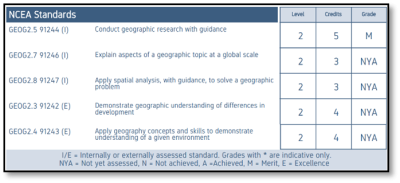 The subject report provides results for assessments in standards that make up the course. At this time of the year, it is not at all unusual to see at least a few ‘NYA’ (Not Yet Assessed) ‘grades’ in the report as there is still a significant amount of course time to go and, therefore, assessment. Teachers are allowed, and are encouraged, to provide an indicative/estimated grade in a standard that indicates how a student is progressing in a standard even if it is not fully assessed at the point of writing. These grades act as feedback on how (well) a student is progressing in the standard and are always subject to change; because there is room for change in a student’s understanding of, and performance in, a standard by the time it is fully completed in an assessment, the estimated grades are merely indicative. On the report, such grades are indicated by an ‘*’. Final summative results for internals do not have the ‘*’.
The subject report provides results for assessments in standards that make up the course. At this time of the year, it is not at all unusual to see at least a few ‘NYA’ (Not Yet Assessed) ‘grades’ in the report as there is still a significant amount of course time to go and, therefore, assessment. Teachers are allowed, and are encouraged, to provide an indicative/estimated grade in a standard that indicates how a student is progressing in a standard even if it is not fully assessed at the point of writing. These grades act as feedback on how (well) a student is progressing in the standard and are always subject to change; because there is room for change in a student’s understanding of, and performance in, a standard by the time it is fully completed in an assessment, the estimated grades are merely indicative. On the report, such grades are indicated by an ‘*’. Final summative results for internals do not have the ‘*’.
Note that all external standards are only formally assessed in an end-of-year exam or in an externally assessed portfolio.
Teacher Subject Comment
It is our belief that students must develop the skills, dispositions, and characteristics to lead their own learning both at and beyond school. Increasingly, in learning at the College, the key competencies of managing self, thinking, using language, symbols and texts, relating to others, and participating and contributing are taught alongside curriculum content and skills because they provide the students with the means to develop into an effective learner beyond being ‘only’ a student of, for example, French! Therefore, in the report, teachers are asked to comment on the student as a learner, that is, on how well they engage with their learning, how well they understand what they are learning, what strategies they successfully bring into their learning and what a student could do next to further improve as a learner in the subject. It is primarily about teachers providing meaningful feedback on students’ learning.
The NZQA website is a treasure trove of resources to do with NCEA and other national qualifications. The student Learner Login is located on the website and is the ‘portal’ through which students access their official assessment results and qualifications records. The website is where students access online examinations and Common Assessment Activities in particular. Other things such as previous years’ assessments are available along with many other assessment resources. It is built to be used by all our ‘stakeholders’ i.e. teachers, students, parents.
NZQA WEBSITE >